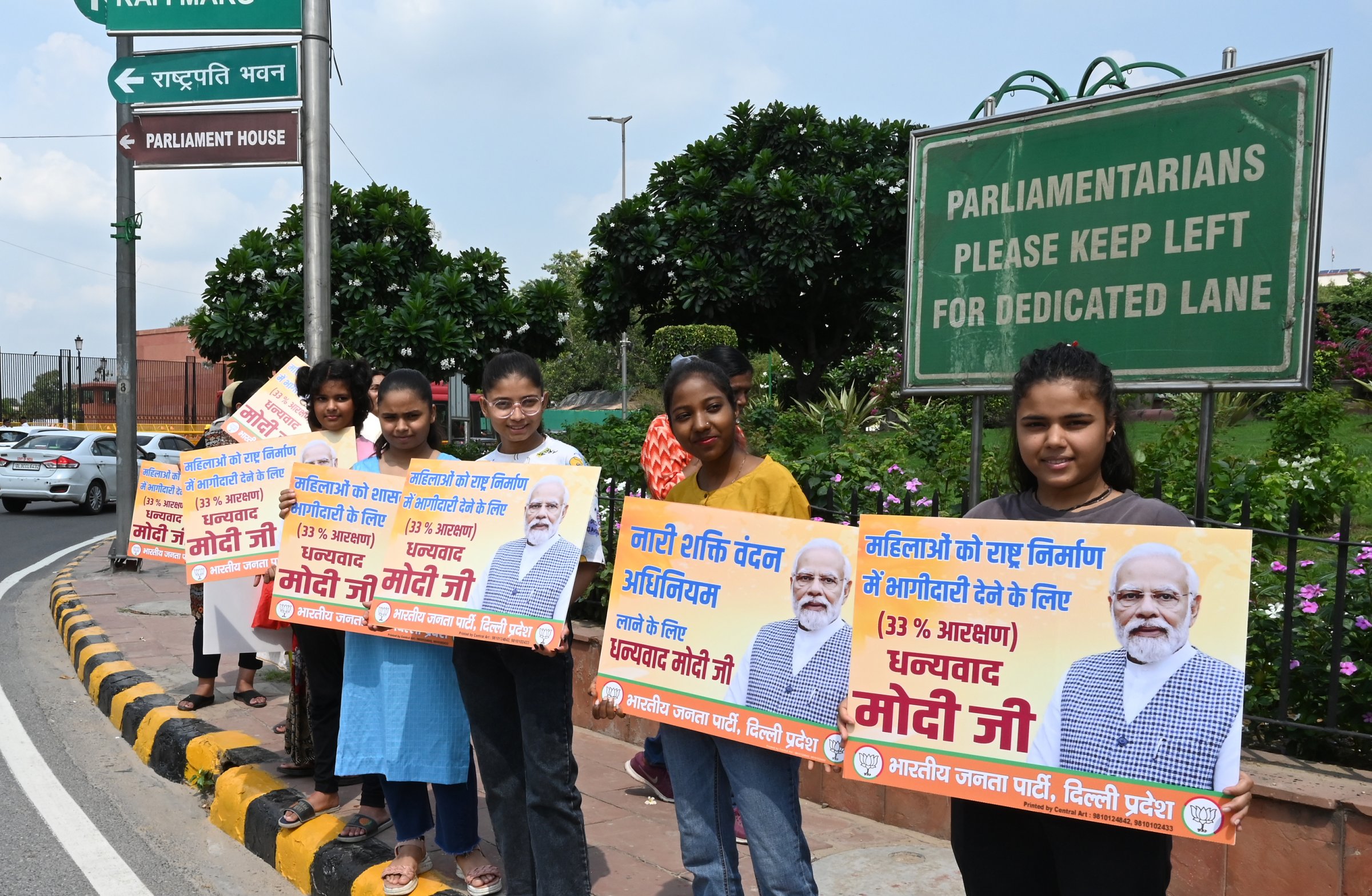
India took a major step forward for gender equality this week when Prime Minister Narendra Modi, during a special session in parliament, announced a bill that would reserve one-third of seats in the more powerful lower house and state legislative assemblies for women.
“This is a historic moment, this is a moment of pride for us,” Modi said in his speech as he introduced the Nari Shakti Vandan Adhiniyam, or Women’s Reservation Bill.
A similar bill was first introduced in September 1996, with nearly every successive Indian government trying, but failing, to pass it into law after facing staunch opposition from conservative heartland parties. “We are not anti-women but we want reservations for women hailing from minority and backward classes first,” said Mulayam Singh Yadav, a leader of the socialist Samajwadi Party in 2010, when a similar bill faced a voting deadlock.
After 27 years in the making, the Women’s Reservation Bill passed in the lower house with near unanimity on Wednesday, before sailing through the upper house late Thursday. The bill now needs the signature of the President to become law.
More From TIME
“U.N. Women applauds the passage of the bill,” says Kanta Singh, a country representative from the international agency. She calls it “one of the most progressive and transformative pieces of legislation that would bring women into the highest decision-making bodies.”
According to Reuters, women occupy just 82 out of 550, or about 15% of seats in the lower house, with the number dipping further in the upper house, where they occupy 31 out of 250 seats, or 12%. A 2015 Report on the Status of Women in India by the Ministry of Women and Child Development noted that women’s representation in parliament and state assemblies was dismal, especially in senior decision-making positions.
Besides parliament, India has had just one woman Prime Minister and two female Presidents since its independence in 1947. So far, only 15 women have served as Chief Ministers.
That record has pushed India, often called the world’s largest democracy, toward the bottom of the global list on gender parity in legislatures. The country ranks 141 out of 185 in the World Economic Forum's latest Global Gender Gap Report.
Read More: A '620km Human Chain' — Indian Women Rally for Equality
Still, there has been a seven-fold increase in women contesting elections since the 1950s. “But they aren't really winning,” says economist Shamika Ravi, who serves on the Indian government’s Economic Advisory Council. She attributes the high probability of losing to the fact that most women run as independent candidates.
“There are major barriers to women entering politics or being in leadership positions, but the entry barrier is not only in terms of having money to run but also whether you have a political party backing you,” Ravi says.
For this reason, Ravi believes the new bill, which creates a legally-binding target for the number of women lawmakers by 2029, will give more political parties an incentive to be more gender inclusive and appoint more women to leadership positions.
The bill also comes at a time when women in India have been more engaged as voters than ever before—accounting for almost half of India’s 950 million registered voters, a number that has increased with every election over the last two decades. And studies have shown that women tend to vote differently from men. For example, while studying the outcomes of a hung election in 2005 in the northern state of Bihar, Ravi says women helped elect a new roster of candidates. “It became very clear that women were voting for change, while the men were voting status quo,” Ravi says.
Backers of the legislation say that quotas for women have already been successful at the local level after they were first introduced in 1993. “That provision ensured remarkable political empowerment of women at the grassroots level,” says Ambar Kumar Ghosh from the Observer Researcher Foundation, a New Delhi-based think tank, citing reports that women occupy around 44% of seats in local assemblies today.
“It’s a significant record that makes India one of the top performing nations in the world in facilitating women's political empowerment at the local level, leaving behind other major countries like France, the U.K., Germany, and Japan,” Ghosh says.
The landmark bill comes months before Indians head to the polls for the next general elections, due by May 2024, when Modi will seek his third term in power. Its passing in the lower house saw an eight hour debate where the opposition parties, led by the Indian National Congress, engaged in a heated battle over who should get credit for the historic legislation.
Sonia Gandhi, who once led Congress, has called the bill “ours.” “I must say it be a victory for the Congress Party if the bill is finally passed,” she told reporters.
This contention is also a good thing, says Ravi, “because it shows that everyone wants to own an idea like the women's reservation." And come election time, it will mean that “all these parties will be ready to give those tickets to women."
More Must-Reads from TIME
- Cybersecurity Experts Are Sounding the Alarm on DOGE
- Meet the 2025 Women of the Year
- The Harsh Truth About Disability Inclusion
- Why Do More Young Adults Have Cancer?
- Colman Domingo Leads With Radical Love
- How to Get Better at Doing Things Alone
- Michelle Zauner Stares Down the Darkness
Write to Astha Rajvanshi at astha.rajvanshi@time.com